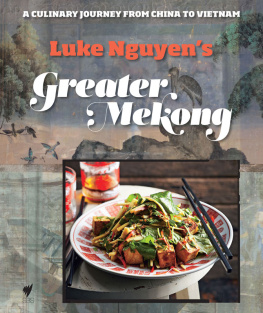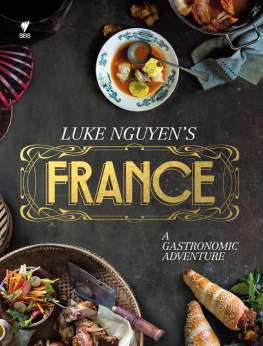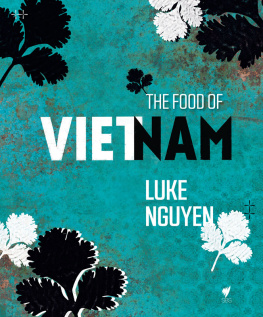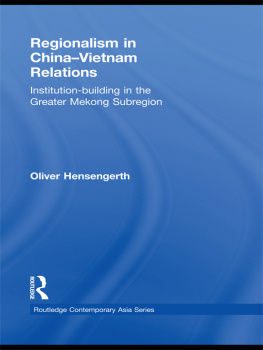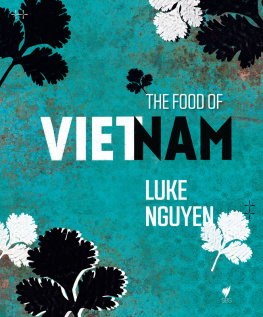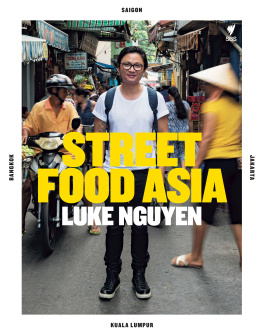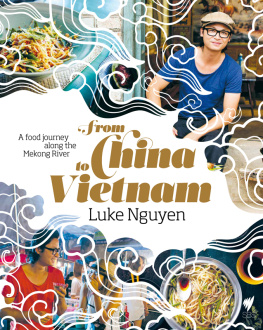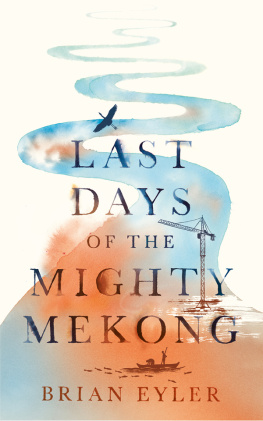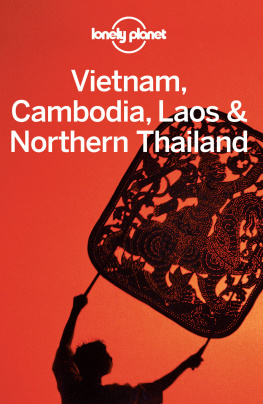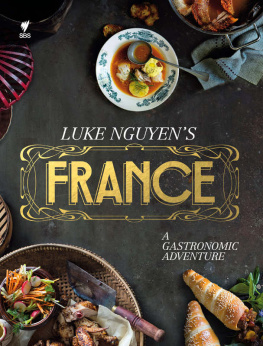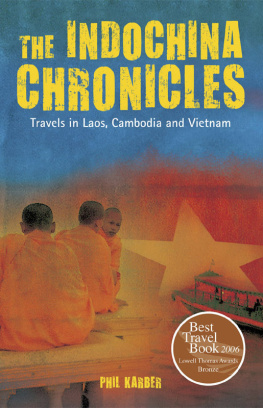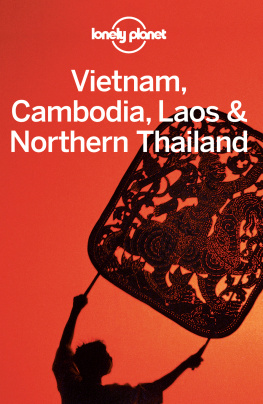CONTENTS
Vietnam is a country I have been returning to for the past ten years, to deepen my understanding of its culture and its diverse regional cuisine. On each visit I would spend my days visiting home cooks, street vendors and cottage industries, from the northern mountains of Sapa through to the cosmopolitan city of Saigon, then further south to the Mekong Delta, visiting my uncles, aunties and cousins who live right on the banks of the Mekong River.
We would wake early in the mornings and jump straight into the river to freshen up. The women would then spend most of the day harvesting rice from the green paddies, while the men fished for mudfish, tilapia and snakehead fish, and children picked plump succulent mangoes, jackfruit, lychees and durian from the orchards. All the produce was then packed onto longboats to begin the eight-hour journey up the Mekong to the wholesale markets in Saigon.
My familys entire livelihood revolved around the Mekong. This abundant river irrigated their rice crops and fruit orchards, supplied hundreds of kilos of fish each day and was their main means of transport.
I began to appreciate how many Vietnamese families along the Mekong Delta rely solely on the river to survive. It was then I realised that it isnt simply the people of Vietnam who depend on the mighty Mekong to sustain their lives.
The Mekong is the twelfth longest river in the world, and the heart and soul of mainland South-East Asia. Over 60 million people depend on the river and its tributaries for food, water, transport and many other aspects of their daily lives. The river also supports one of the worlds most diverse fisheries, nurturing over 1500 different species of fish within its vast ecosystem.
I decided to embark on a journey to explore the many countries along the Mekong that use the river every day for nourishment and life. I wanted to immerse myself in the culture and lifestyles of the people in the Greater Mekong region and learn of the incredibly diverse produce, ingredients and cuisines of these areas.
My discovery of the Greater Mekong starts where the mighty river begins its flow from the Tibetan Plateau, making its way down to Chinas Yunnan Province the most ethnically diverse region in China. I explore the culinary cultures and centuries-old traditions and stories of the Yunnan, from the Naxi people of Lijiang to the Dai communities of Xishuangbanna.
Journeying south to Myanmar, I uncover the unique flavours of the former capital, Yangon. I meet the friendliest and most hospitable people that I have ever encountered, and learn the family recipes of Inle Lake communities and cook with the hill tribes of the Shan State.
I then cross the border into northern Thailand. Beginning in Chiang Khong, and then in Mae Salong and Chiang Mai, I learn from local fishermen, home cooks and Akha grandmothers that the mighty Mekong River is more than just a source of food it is a way of life.
My journey continues down the lower Mekong to Laos, where I discover unusual ingredients and unique dishes that surprise my senses. I start in the countrys capital, Vientiane, where I glean a better understanding of the cuisine, and the many influences that have shaped it to become the next big flavour to hit the Western world. I then visit the nations food capital, Luang Prabang, where I experience the seven-day celebrations of the Lao New Year, and sample the wonderful street food this charming colonial town has to offer.
I travel further south to 4000 Islands, where the Mekong River spills across and around a giant expanse of rocks, rapids and islands on its way down to Cambodia. This stunning area has some of the most unusual fish and insect dishes in the country.
As I cross over to Cambodia, I am overwhelmed by the peoples stories, resilience, and their passion for their cuisine and culture. Throughout the country, beginning in Siem Reap, I meet inspiring cooks who are striving to bring back ancient Khmer food and put their cuisine back on the world map.
Further south, I arrive in the capital, Phnom Penh, where in just a few moments one can see and feel the true Cambodia: the contradictory contrast of the old and new, poor and rich, harsh and kind, honest and corrupt. In Phnom Penh I sample everything from rustic street food to high-end dining, but what stays true is the authenticity of Khmer cuisine.
The Mekong River flows further south through Cambodia to Kep and Kampot, known to have the best crab, squid and green peppercorns in all of South-East Asia.
A simple short walk across some white lines and a boom gate, and Im in my mother country, Vietnam. Here I travel with my parents, digging deeper, wanting to learn more about the lives of the Vietnamese people along the Mekong Delta. We start in Chau Doc, where I sample the world-class fermented fish and the countrys best roast suckling pig.
I continue by boat to Cai Be, where river meets land, to visit the colourful vibrant floating markets, and spend time at local cottage industries learning age-old cooking techniques.
My Greater Mekong adventure sadly ends in Ben Tre, where I am taught everything there is to know about the coconut tree. And it is in Ben Tre that I am initiated by the locals, coaxed into eating mice and live coconut worms, finally becoming a true Vietnamese man.
CHINA
KUNMING TO XISHUANGBANNA
Of all the countries Ive visited in Asia, it is the people of China who have impressed me most with their knowledge of and reverence for their regional food specialties. I witnessed many passionate debates about food and ingredients, and learnt that in the story of food, youll also find the stories of love, war, deceit, comedy, tragedy, triumph and celebration, With such a rich and long history, it is little wonder China remains such a master of Asian cuisine.
One of the many things I love about China is its tradition of storytelling, which holds little gems of history and memories of times past.
By discovering a dish or item of produce, Id often uncover with it a story dating back centuries a wonderful way of keeping the past locked into the present, and recognising history in the everyday food that is still grown and traded.
Id felt a lot of pressure starting to film this new cooking series in China, as I couldnt speak the language, and the ethnic cuisines in this vast country are so different from what we know of in the West as Chinese a huge contrast for me to Vietnam where, in comparison, Id felt protected and comfortable within my own heritage and language.
China, to me, is the grandmother of all Asian cuisines, and the source of so many other Asian ways and authenticities.
Every day in China, I would learn of new medicinal herbs, spices, green vegetables, oils, cooking techniques and flavours. Meeting the people and wandering through the markets would take me on an exciting culinary journey, educating me about real Chinese cooking and ingredients. I immersed myself so deeply in the culture, eating everything on offer and doing my best to speak the language, that I began to feel like a local.
I started my journey in the Yunnan capital, Kunming, affectionately known as the City of Eternal Spring, where I discovered the iconic dishes and old-world stories of this great metropolis.
Yunnan province in southern China is the most ethnically diverse area in the country. It is also the region that has long been known as Shangri La the remote, mythical long-lost paradise on earth. The landscape here is dramatic and beautiful, and home to interesting and sometimes rare ingredients.

